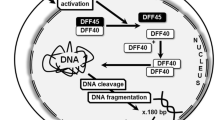Abstract
A novel theory is proposed regarding the action of ionizing radiation in the range of very low doses. The basic premise of the theory presented is that the low-dose effect cannot be explained by direct damage to the DNA (as has generally been assumed) and that effects on cellular membranes should be considered instead. Low-dose radiation damaging the plasma membrane decreases the concentration of low-molecular weight compounds (LMWC) inside the cell, which through an unspecific mechanism induces an activation of all enzymes. The mechanism described here has been well substantiated. The changes in the intracellular contents of LMWC and the increase of pHin cause chromatin rearrangements, alterations in DNA folding and finally, if the latter are strong enough, expression of various ”silent” genes including repair enzyme genes.
Similar content being viewed by others
Author information
Authors and Affiliations
Additional information
Received: 2 February 1999 / Accepted: 15 May 2000
Rights and permissions
About this article
Cite this article
Eidus, L. Hypothesis regarding a membrane-associated mechanism of biological action due to low-dose ionizing radiation. Radiat Environ Biophys 39, 189–195 (2000). https://doi.org/10.1007/s004110000061
Issue Date:
DOI: https://doi.org/10.1007/s004110000061



